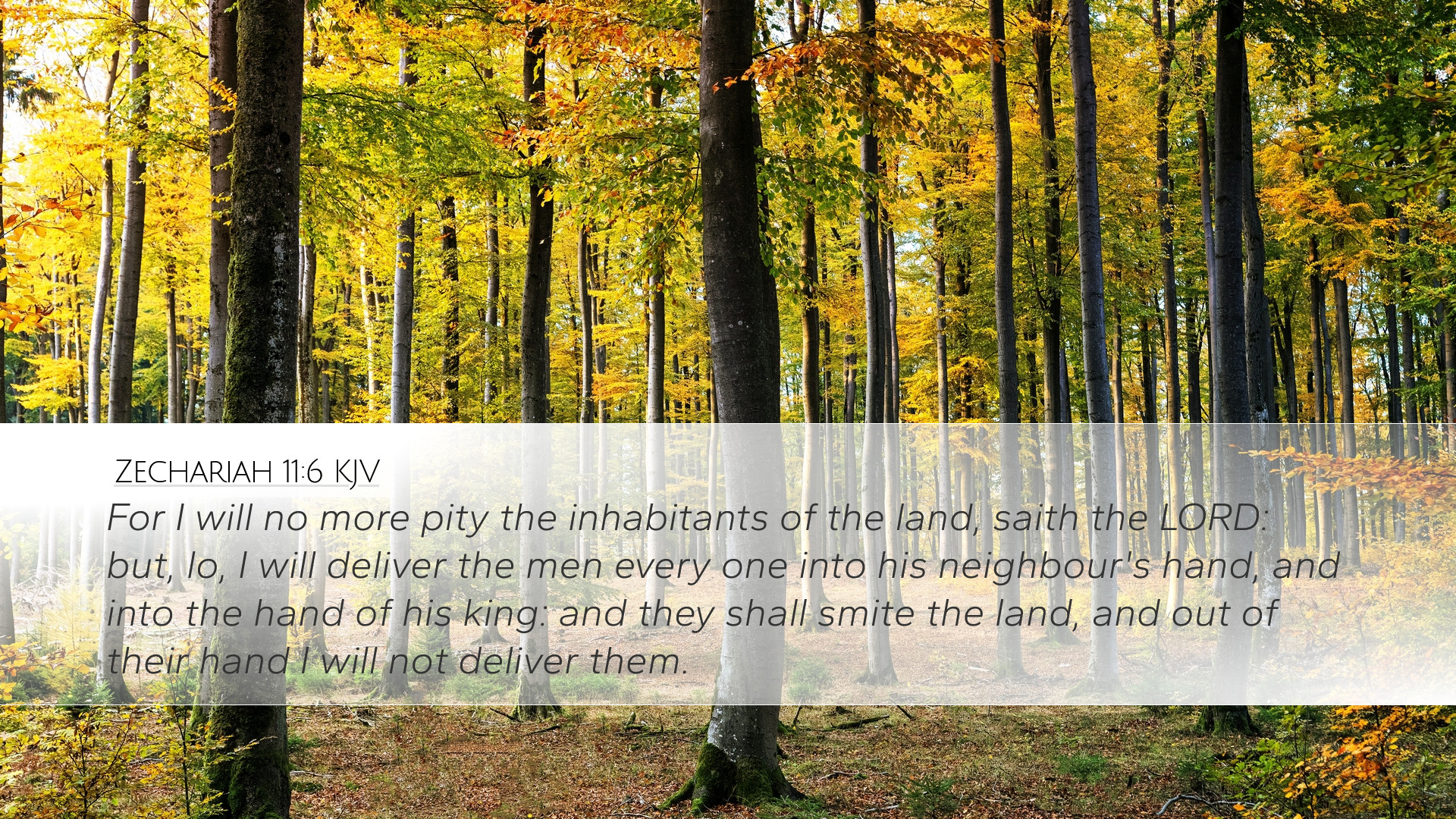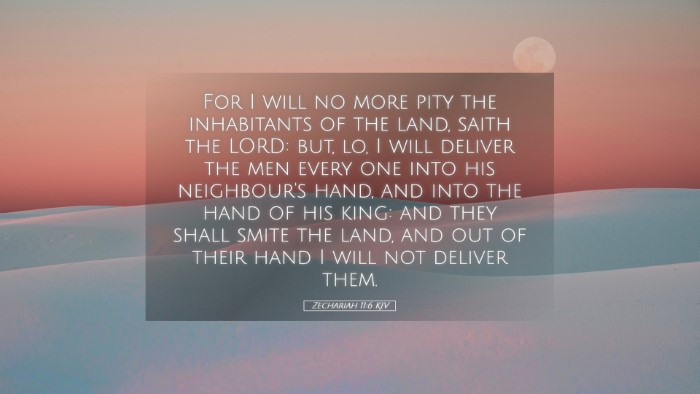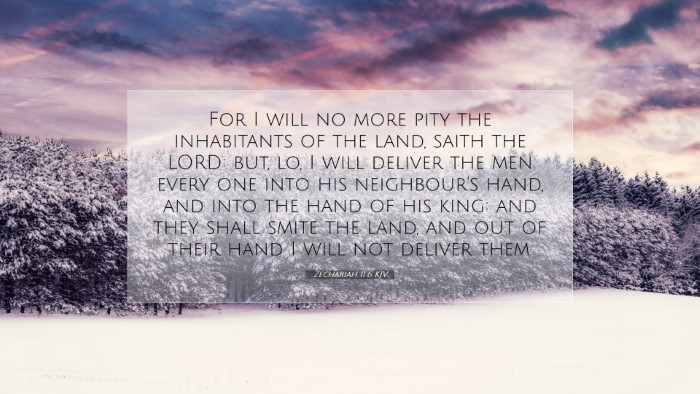Old Testament
Genesis Exodus Leviticus Numbers Deuteronomy Joshua Judges Ruth 1 Samuel 2 Samuel 1 Kings 2 Kings 1 Chronicles 2 Chronicles Ezra Nehemiah Esther Job Psalms Proverbs Ecclesiastes Song of Solomon Isaiah Jeremiah Lamentations Ezekiel Daniel Hosea Joel Amos Obadiah Jonah Micah Nahum Habakkuk Zephaniah Haggai Zechariah MalachiZechariah 11:6
Zechariah 11:6 KJV
For I will no more pity the inhabitants of the land, saith the LORD: but, lo, I will deliver the men every one into his neighbour's hand, and into the hand of his king: and they shall smite the land, and out of their hand I will not deliver them.
Zechariah 11:6 Bible Commentary
Commentary on Zechariah 11:6
Zechariah 11:6 states, "For I will no longer have pity on the inhabitants of the land, declares the Lord. Behold, I will cause each of them to fall into the hand of his neighbor and each into the hand of his king, and they shall crush the land, and I will deliver none from their hand." This verse conveys a profound declaration of judgment from God, highlighting themes of leadership, separation, and divine justice. Below is an amalgamation of insights drawn from public domain commentaries by Matthew Henry, Albert Barnes, and Adam Clarke.
1. Contextual Background
This verse occurs within the prophetic ministry of Zechariah, whose work often oscillated between messages of hope and impending judgment. In Zechariah 11, the prophet is instructed to act as a shepherd and symbolize the relationship between God and His people. The surrounding context provides an essential backdrop for understanding the urgency of this particular message about judgment.
2. Divine Displeasure
Henry notes that the pronouncement “I will no longer have pity” indicates a decisive turning point in God’s dealings with His people. When divine patience gives way to judgment, it illustrates the seriousness of humanity's rebellion against God’s commandments. Drawing from the text, we see that God's mercy is not infinite; there comes a moment when He acts against persistent sin.
Implications for Leadership
Barnes emphasizes the role of leadership in this verse. The inhabitants of the land represent different strata of society, including their rulers. The implications of this verse serve as a warning to leaders: when they neglect their moral and spiritual responsibilities, they not only jeopardize their standing but also expose those under their care to divine wrath. Leaders are held to a stricter standard, as they influence the destiny of those they guide.
Judgment and Accountability
Adam Clarke underscores the components of accountability that emerge in this passage. Each individual is depicted to “fall into the hand of his neighbor” and “into the hand of his king,” signifying the breakdown of societal order where judgment prevails. This demoralization reflects a society torn apart by conflicts arising from a loss of divine guidance and illustrates how divine judgment can manifest in interpersonal and societal struggles.
3. The Role of Neighborly Relations
Barnes further elaborates on the phrase “each of them to fall into the hand of his neighbor.” Here, he suggests that a lack of compassion and mutual trust among individuals leads to calamity. The absence of divine oversight provokes hostility and conflict, exhibiting how communal ties can dissolve when God withdraws His favor.
Consequences of Disobedience
This verse succinctly encapsulates the reality that disobedience to God results in a cascade of consequences. Without God’s mercy, the populace not only suffers from internal strife but is also left vulnerable to external oppressors. Henry posits that the ultimate breakdown of societal cohesion emphasizes the necessity for dependence on divine wisdom and guidance.
4. Crushing the Land
The expression “they shall crush the land” suggests a brutal, destructive outcome for the earth itself. This not only refers to the physical land that bears the burden of lawlessness but also symbolizes the desolation that follows the absence of God’s blessing. Clarke draws attention to the phrase, indicating that such crushing can also imply a judgment that further alienates the people from God’s restorative power.
Spiritual Implications
In reflecting on what it means for the land to be crushed, theologians uncover a deeper understanding of spiritual desolation. Leaders who fail to uphold God’s truths may inadvertently harm the spiritual landscape of their community, leading to a generation disconnected from God’s promises. The destruction of spiritual vitality precedes the physical ineffectiveness of the land itself, serving as a cornerstone truth for students of theology.
5. The Certainty of Divine Judgment
The phrase “I will deliver none from their hand” carries a weighty finality. This declaration reflects the omniscience of God, who sees and responds to the actions of His people. Henry reminds readers that escape from divine judgment becomes impossible when God Himself decides to withdraw. In a moment of reckoning, the inhabitants are left with no means of deliverance apart from genuine repentance.
The Call to Repentance
The starkness of this verse serves as a call to self-examination for contemporary believers and leaders alike. It compels an urgent introspection regarding their relationship with God and fidelity to His word. Barnes eloquently asserts that recognition of divine justice should lead to a heart posture of humility and contrition before God, fostering a proactive return to faithfulness.
6. Conclusion
In summation, Zechariah 11:6 serves as a potent reminder of the consequences of sustained rebellion against a holy God. The insights drawn from Henry, Barnes, and Clarke enrich the understanding of divine judgment, accountability among leaders, and the inevitability of societal breakdown without God’s guidance. As pastors and theologians reflect on this text, may it inspire a renewed commitment to uphold God’s truths and cultivate a society marked by obedience and divine favor.


